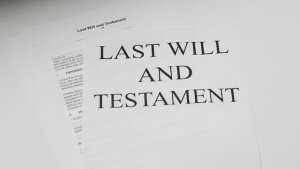Making a Will by video link

Contact
Table of Contents
The Government has recently announced plans to allow for the witnessing of Wills and Codicils by video conferencing. This is a welcome step which will enable many clients who are self-isolating or shielding to prepare a valid and legally binding Will in the current circumstances.
The current law
The current law on the validity of Wills dates back to the Wills Act 1837. The prescribed formalities for a valid Will are as follows:
- The Will should be in writing;
- It should be signed by the testator, or by some other person in his presence and by his direction;
- It must appear that the testator intended by his signature to give effect to the Will;
- The testator’s signature is made or acknowledged by the testator in the presence of two or more witnesses present at the same time; and
- Each witness must either attest and sign the Will or acknowledge his signature, in the presence of the testator (but not necessarily in the presence of any other witness).
Over time case law on this matter has evolved to allow for a Will to be witnessed through a window or open door of a house or a vehicle, as long as there was a clear line of sight.
However, despite the rapid development of technology, there has previously not been any provision for the line of sight to be virtual.
How to execute your Will remotely
The new legislation, the Electronic Communications (Amendment) (Coronavirus) Order 2020, will temporarily allow for the presence to be either physical or virtual.
The Government guidance on remote execution of wills does not specify the video technology or device to be used. However, the original requirement that there must be a “clear line of sight” between the testator and the witnesses remains. The process must be live and, whenever possible, it should be recorded.
The Government has also advised amending the usual wording of the attestation clause to clarify the new circumstances of signing the Will.
The testator should first hold the front page of the Will to the camera and subsequently turn to the last page where they are signing. The testator should then arrange for the original signed Will to be transferred to the witnesses for their signatures. The guidance is that this should happen within 24 hours, although that timeframe may be difficult to achieve, especially when using the post.
Importantly, on this occasion the new law will have a retrospective effect. The legislation is expected to be backdated to the 31st of January 2020, which was the date of the first reported case of COVID-19 in the UK. The new law will be kept under review; the initial assumption is that it will remain in place for two years until the 31st of January 2022.
Other requirements for a valid Will
It is important to note that the new legislation will only apply to the testator, the person signing the Will, and the witnesses witnessing the Will. This means that there is no provision for the use of technology in relation to other requirements of a valid Will. For example, there is no provision for the testator to instruct someone remotely to sign on their behalf. This instruction can only be given in person.
Additionally, no electronic signatures or counterpart Wills are allowed. This means that the same original Will needs to be signed by the testator and then transferred to the witnesses for their signatures.
Potential difficulties with remote witnessing
There are some valid concerns about the potential difficulties associated with remote witnessing of Wills. For instance, whilst we may have a clear line of sight of the testator, we do not have a full sight of the room through a video link. Hypothetically, there may be someone else in the room, out of the view of the camera, exerting undue influence on the testator. As a result, the witnesses will need to remain particularly vigilant.
There are also practical concerns about transferring the Will between the testator and the witnesses, as it may get lost, intercepted or delayed.
However, given the need for many vulnerable people to shield, it is a welcome solution to ensure that they can make valid wills in the current circumstances.
If you are interested in executing your Will remotely, we strongly advise you to seek a solicitor’s advice to ensure that your Will is fully compliant with the new regulations. Please contact Osbornes Law on 020 7485 8811 and ask to speak to a member of the Private Client team or complete an online enquiry form below.
Share this article
Contact us today
Call us 020 7485 8811
Email us Send us an email and we’ll get back to you
More from JanVIEW ALL
- 12.5.2025
Estate Planning: New Tax Rules for DC Pensions
New changes to the taxation of DC Pensions will impact estate planning decisions In the Autumn Budget 2024, the Chancellor announced...
Read more - 1.3.2023
How to prevent someone contesting a will
It is fairly rare in my experience for a parent to write a child out of their will but that...
Read more - 8.2.2023
Gifting Property to Children
Can I gift property to my children? Gifting a property to your adult children is a relatively complex transaction but...
Read more - 15.11.2022
Contentious Probate Case Studies
Contentious probate involving business assets Our contentious probate solicitors act for the defendants to a claim issued to pronounce in...
Read more - 27.10.2022
Contesting A Will Case Studies
Will dispute on grounds of lack of capacity Our contesting a will solicitors acted for the claimants, the adult daughters...
Read more - 1.1.2022
How to Divide Assets in a Blended Family
In this article we look a scenario for someone who is making a will where they are married with children...
Read more - 13.9.2021
Worldwide Probate Dispute
Considerable wealth and assets all over the world The deceased died in Ireland leaving very considerable wealth and assets all...
Read more - 13.9.2021
US/UK cross border probate: Case Study
International Probate and Estate Planning Introduction to the Case Our probate lawyers in London were instructed by a US-based widow...
Read more - 7.9.2021
What Happens to Debt When you Die?
It is a common misconception that a person’s debts die with them. After you die, your debts become the...
Read more - 13.8.2021
What is reasonable financial provision in 1975 Act claims?
Understanding “Reasonable Financial Provision” “Reasonable financial provision” under the Inheritance Act 1975, refers to the financial support that is reasonable for...
Read more - 2.9.2020
Left Out of a Will: What Can I...
I was left out of my parent’s will. What can I do? Understanding Your Situation Whilst testators in England...
Read more - 10.6.2020
Leaving money to charity in your will
Why leave money to charity in your Will? Leaving money to charity in your will is a significant source of...
Read more - 22.10.2019
Forced Heirship on Property Abroad
Own property abroad? Beware of forced heirship rules Whether it’s a holiday home, a second home or a place...
Read more - 19.7.2019
Guardianship (Missing Persons) Act 2017
The Guardianship (Missing Persons) Act 2017 comes into force on 31 July 2019. This is a full 27 Months after the bill was given...
Read more - 3.7.2019
Assets abroad? Why you may need more than...
The Challenges of International Assets in Wills As more of us become internationally mobile, it’s increasingly common to own...
Read more - 25.3.2019
How to Claim for an Unclaimed Estate
Finding beneficiaries for unclaimed assets The amount of unclaimed assets has nearly doubled in the last year, with the Prince...
Read more - 25.3.2019
Cross Border Issues – Wills and Succession
An increasing number of individuals have connections with more than one jurisdiction. Conflicting rules can significantly affect their estate planning...
Read more - 25.3.2019
What happens when someone dies without a will?
Dying without a will When someone dies without a Will, the Intestacy Rules apply. These rules, which are set out...
Read more



















